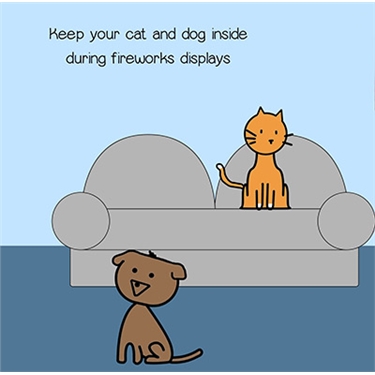Survey reveals that two thirds of pets are worried by fireworks
01 November 2014
 A new survey from Dogs Trust and Cats Protection has revealed that two thirds of pets are worried by fireworks and that 93% of their owners alter their routine during fireworks celebrations to try to minimise the trauma on their pets.
A new survey from Dogs Trust and Cats Protection has revealed that two thirds of pets are worried by fireworks and that 93% of their owners alter their routine during fireworks celebrations to try to minimise the trauma on their pets.
The survey of 3,750 pet owners shows that two-thirds of dogs and more than half of cats display signs of fear and as a result, nearly a fifth of owners have consulted a veterinary surgeon or animal behaviourist to help their pet deal with their fireworks fear.
Nicky Trevorrow, Cats Protection’s Behaviour Manager said: “When faced with a stressful situation such as fireworks a cat’s natural behaviour is to run away, seek an elevated perch and/or hide so it is important for owners to provide hiding places for their cat during fireworks season.”
An infographic created by the two charities explains how to keep your cat or dog calm and safe during fireworks celebrations –
download here.
Remember, remember…your cat during fireworks season
Apart from the obvious physical damage that can occur as a result of accidental contact with fireworks, cats can also be badly affected by the resultant noise and lights. In some cases, behavioural problems could arise as a result of fear and stress, including soiling of the home or excessive grooming, while there is also the danger of
them running away.
The following recommendations should ensure that you can enjoy the celebrations with the peace of mind that your cat will be safe and sound:
- Keep your cat in after dark and provide him with a litter tray if he is used to having garden access
- Try to reduce outside noise by keeping windows shut and curtains drawn. You may find that playing soothing music or having the TV on can also help. Try not to reinforce fearful behaviour by soothing and reassuring a cat that is looking anxious.
- While cats like to be settled in a cosy, familiar territory such as a comfy bed or favourite chair, when feeling scared they need safe places to hide. Ensure they can exhibit this natural behaviour by providing access to a hiding place, such as under the bed, an igloo-style cat bed or something simple like a cardboard box.
- Make sure all doors and windows are securely fastened – sensitive cats may be startled by the noise and try to run away.
- Ask your vet about using synthetic pheromone plug-in diffusers like Feliway, as these can create a reassuring environment for the cat.
If you are having your own bonfire night celebration this year, then consider:
- Buying hand-held cascading fireworks rather than the noisier varieties.
- Holding a ‘silent’ fireworks display – many companies now offer quiet or almost silent fireworks – giving you the same spectacle without the loud bangs.
- Keeping fireworks and bonfire displays as far away from homes as possible, to minimise any adverse effects on animals indoors, although bear in mind the effect these displays will have on wild animals.
- Check bonfires before lighting them to ensure that no small animals are sleeping inside.
Click here to download this information in a handy leaflet.